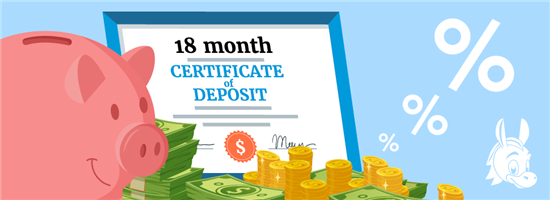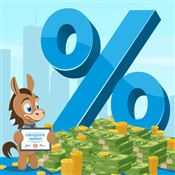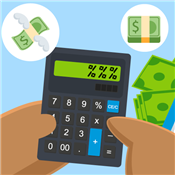Best 18 Month CD Rates for February 2024
Ad Disclosure: This article contains references to products from our partners. We may receive compensation if you apply or shop through links in our content. This compensation may impact how and where products appear on this site. You help support CreditDonkey by using our links.
Get 18-month CDs with impressive APY. See which banks offer the best rates today.
 |
If you're willing to set aside money for under two years, consider looking at 18-month CDs.
They can have competitive rates, making them a worthwhile option for storing your funds. You also won't need to tie up your money for an extended period.
With that, let's take a look at the best 18-month CD rates today and find out how to get the ideal CD for you.
What is an 18-Month CD?
An 18-month CD is a savings account where you keep a set amount of money for a fixed period of a year and a half. In return, you get a rate that stays the same throughout the entire term of your CD. This rate is also usually higher than a standard savings account.
One of the highest rates on an 18-month CD is .
How Do 18-Month CDs Work?
18-month CDs work just like other CDs, meaning you earn a fixed interest rate for the entirety of your term which is a year and a half. Unlike most savings accounts, you typically can't take out your money until the CD matures.
This restriction allows banks to offer more competitive APY. If you do need to withdraw early, expect penalties ranging from 90 to 180 days' worth of interest.
CD terms can range from as short as 1 month and up to 10 years in length. However, not all banks will offer the same CD terms. If you can't find a 10-year CD at your usual institution, try shopping around other banks and credit unions.
How much does an 18-Month CD pay?
If you deposit $1,000 in an 18-month CD with a 5% APY, you can earn about $76 after the term ends. Here's a table to show how much you can earn on an 18-month CD:
| Rate | $1,000 | $2,000 | $5,000 | $10,000 |
|---|---|---|---|---|
| 0.50% | $1,008 | $2,015 | $5,038 | $10,075 |
| 1.00% | $1,015 | $2,030 | $5,075 | $10,150 |
| 1.50% | $1,023 | $2,045 | $5,113 | $10,226 |
| 2.00% | $1,030 | $2,060 | $5,151 | $10,301 |
| 2.50% | $1,038 | $2,075 | $5,189 | $10,377 |
| 3.00% | $1,045 | $2,091 | $5,227 | $10,453 |
| 3.50% | $1,053 | $2,106 | $5,265 | $10,530 |
| 4.00% | $1,061 | $2,121 | $5,303 | $10,606 |
| 4.50% | $1,068 | $2,137 | $5,341 | $10,683 |
| 5.00% | $1,076 | $2,152 | $5,380 | $10,759 |
| 5.50% | $1,084 | $2,167 | $5,418 | $10,836 |
| 6.00% | $1,091 | $2,183 | $5,457 | $10,913 |
Try this simple CD calculator to know how much you can earn on other CD terms and rates.
Interest on an 18-month CD and a traditional savings account work quite similarly. However, with CDs, you earn with a fixed rate over the fixed 18-month term, unlike savings accounts whose rates can change anytime. Compound interest can also apply daily, monthly, quarterly, or annually.
Is an 18-month CD Worth It?
If you're okay with locking your money away for a year and a half, consider looking at 18-month CDs. Some have impressive rates that will make it worth the commitment. Just make sure you won't need the funds soon, as early withdrawal penalties can be costly.
Ultimately, whether it's worth it or not depends on your own financial goals and preferences. The important thing is to get a CD that aligns with your plans for maximum benefit from the fixed APY.
The answer really depends on what your goals are. If you'll need your money for a little over a year, you can consider getting an 18-month CD if it suits the timeline. Always choose a CD term that fits your goals.
Can You Lose Money on an 18-month CD?
Generally, you shouldn't be losing any money on 18-month CDs. CDs are federally insured for up to $250,000 if your bank or credit union is a member of the FDIC or the NCUA. This means your deposits are covered if your bank closes down.
However, early withdrawal fees can still reduce your interest earnings or even a part of your principal if you choose to close your CD before it matures.
Early withdrawal penalties vary depending on the CD term length. For 18-month CDs, it would range from 90 to 180 days' worth of interest. Penalties are set at the discretion of a bank or credit union.
Pros and Cons of 18-Month CDs
Pros:
- Higher rates than traditional savings accounts
- Low risk with guaranteed and fixed returns
- Lock in high APY in case interest rates go down
- Curb unnecessary spending
Cons:
- Early withdrawal penalties
- Very limited access to your money
- Miss better rates or investments because of the fixed term
CIT Bank Platinum Savings - 3.75% APY
- 3.75% APY with a balance of $5,000 or more
- 0.25% APY with a balance of less than $5,000
- $100 minimum opening deposit
- No monthly maintenance fee
- Member FDIC
No. A CD typically won't let you withdraw during its term. Otherwise, you'll be paying early withdrawal penalties.
Where to Find the Best 18-Month CD Rates
If you're searching for high 18-month CD rates, consider exploring online banks and credit unions.
Online banks often offer better APYs on 18-month CDs due to lower overhead costs without physical branches. While credit unions, being non-profit, also tend to provide competitive rates.
How to Choose the Best 18-month CD
If you're having trouble choosing the best 18-month CD for you, here are some questions to guide you:
- What is the APY?
If getting a good rate is your priority, then make sure you're looking at the highest rates available to you. You'll want to make sure you've gone through a list of banks and credit unions to see where the best rates are. - How much is the early withdrawal penalty?
Although you'd want to avoid closing your CD before it matures, unexpected events can happen that might leave you no choice but to do so. Try to find an 18-month CD with lower withdrawal penalties. Even better if you find no-penalty CDs. - Is there a minimum deposit requirement?
Some CDs might require your deposit to be at least a certain amount. This could range from $500 to $2,500 so if you have a budget in mind, make sure you check if you can meet any minimum deposit requirement. - Are there other features?
Some CDs might have handy features like bump-up CDs which can increase your rate during the term, or add-on CDs that let you add more deposits to your CD. No-penalty CDs are especially good too if you want to worry less about early withdrawal penalties. - Is the bank or credit union reliable?
Make sure you're working with an FDIC or NCUA member bank or credit union so your deposits are covered. But even then, you'd want to bank with an institution that will continuously operate, at least for as long as you have a CD with them.
Yes, some CDs may pay interest every month. The frequency can vary depending on the specific CD offering. To maximize your interest earnings, try not to withdraw your interest and keep it in the CD until it matures.
How to Open an 18-month CD
Getting an 18-month CD is generally simple, here's a step-by-step guide to help you:
- Determine where to open the CD.
Take note of the CD's disclosures to identify whether it is exclusive to online platforms, physical branches, or both. - Complete the application form and review the terms.
Fill out the application form and submit the required documents. Then, review the terms and conditions which cover important details like interest payments, maturity date, and penalties for early withdrawal. - Submit and fund your CD.
You can submit your application after agreeing to the terms. Once submitted, you can fund your CD through various methods, such as online transfers, wires, or check deposits.
If you're not sure how to open a CD with a specific bank or credit union, it is best to reach out to a representative to help you through the process.
What Happens at the End of an 18-Month CD?
Typically, your bank or credit union will give you a heads-up before your 18-month CD reaches maturity. When it's about to mature, consider whether you'd like to:
- Automatically renew the CD.
- Renew the CD with a different amount, term, or both.
- Withdraw all your funds and close the CD.
Make sure to communicate your decision to the bank either before or during the grace period following the CD maturity. Failing to do so might result in automatic renewal, and early withdrawal penalties could come into play.
Alternatives to a 18-Month CD
If you're still unsure about 18-month CDs, here are some alternatives you can check out.
High-Yield Savings Accounts
For easy access to your money and competitive rates, try looking at online high-yield savings accounts. These can give great rates too although they are not fixed like CDs.
- CIT Bank Platinum Savings:
3.75% APY - UFB Portfolio Savings:
Earn up to 3.40% APY - Western Alliance Bank:
High-Yield Savings Premier - 3.90% APY - Mission Valley Bank:
High Yield Savings Account - 3.96% APY - Axos ONE:
Earn up to 4.31% APY
Money Market Accounts
If you want more flexibility with your money, money market accounts may have competitive rates too. And, it might even come with a debit card, ATM access, and checks.
- UFB Portfolio Money Market:
Earn up to 3.40% APY
Long-Term CDs
If you can go beyond 18 months, why not lock in a good rate for longer? Long-term CDs like 2 or 3 years might have better or similar rates.
- Quontic:
24 Month CD - 3.35% APY - Ally Bank:
3-Year CD - 3.50% APY - Associated Bank:
26-Month CD - 2.00% APY - Synchrony Bank:
24-Month Bump Up CD - 2.80% APY - Popular Direct:
24-Month CD - 3.45% APY
CD Ladder with Short-Term CDs
If access to your funds is a big issue, try building a CD ladder stretching 18 months instead. You can get shorter CD terms that may offer competitive rates for your ladder.
- Western Alliance Bank:
3-Month High-Yield CD - 3.80% APY - CIT Bank:
13 Month CD - 3.25% APY - Quontic:
6 Month CD - 3.75% APY - Consumers Credit Union:
10-Month Super Jumbo CD - 3.85% APY - Sallie Mae Bank:
14-Month No Penalty CD - 3.40% APY
18-Month CD FAQs
When is the best time to get an 18-month CD?
For CDs, it's best to get them when interest rates are high. 18-month CD rates follow the movement of the Fed Funds rate. If the Fed Funds rate is expected to increase, you'd best time getting a CD with those changes.
Is an 18-month CD better than a savings account?
If you need your money in the next 18 months, choose a savings account. If not, consider an 18-month CD for higher rates. Both are federally insured, as long as your bank or credit union is an FDIC or NCUA member, ensuring equal security.
Will 18-month CD rates go up?
18-month CD rates may not always go up, but they often follow the Fed Funds rate. If the Fed Funds rate increases, you can expect 18-month CD rates to go up as well. Monitoring changes in the Fed Funds rate is a good way to predict potential CD rate increases.
Bottom Line
If you have financial goals that go beyond a year, consider getting an 18-month CD. It's a good option if you want high rates and are okay with setting aside your money for a while.
However, if you know that you will need to move your funds around in the next 18 months, a CD may not be the best option. Consider more flexible options instead like high-yield savings accounts.
Rue Atanacio is a research analyst at CreditDonkey, a bank comparison and reviews website. Write to Rue Atanacio at rue.atanacio@creditdonkey.com. Follow us on Twitter and Facebook for our latest posts.
Note: This website is made possible through financial relationships with some of the products and services mentioned on this site. We may receive compensation if you shop through links in our content. You do not have to use our links, but you help support CreditDonkey if you do.
|
|
| ||||||
|
|
|







